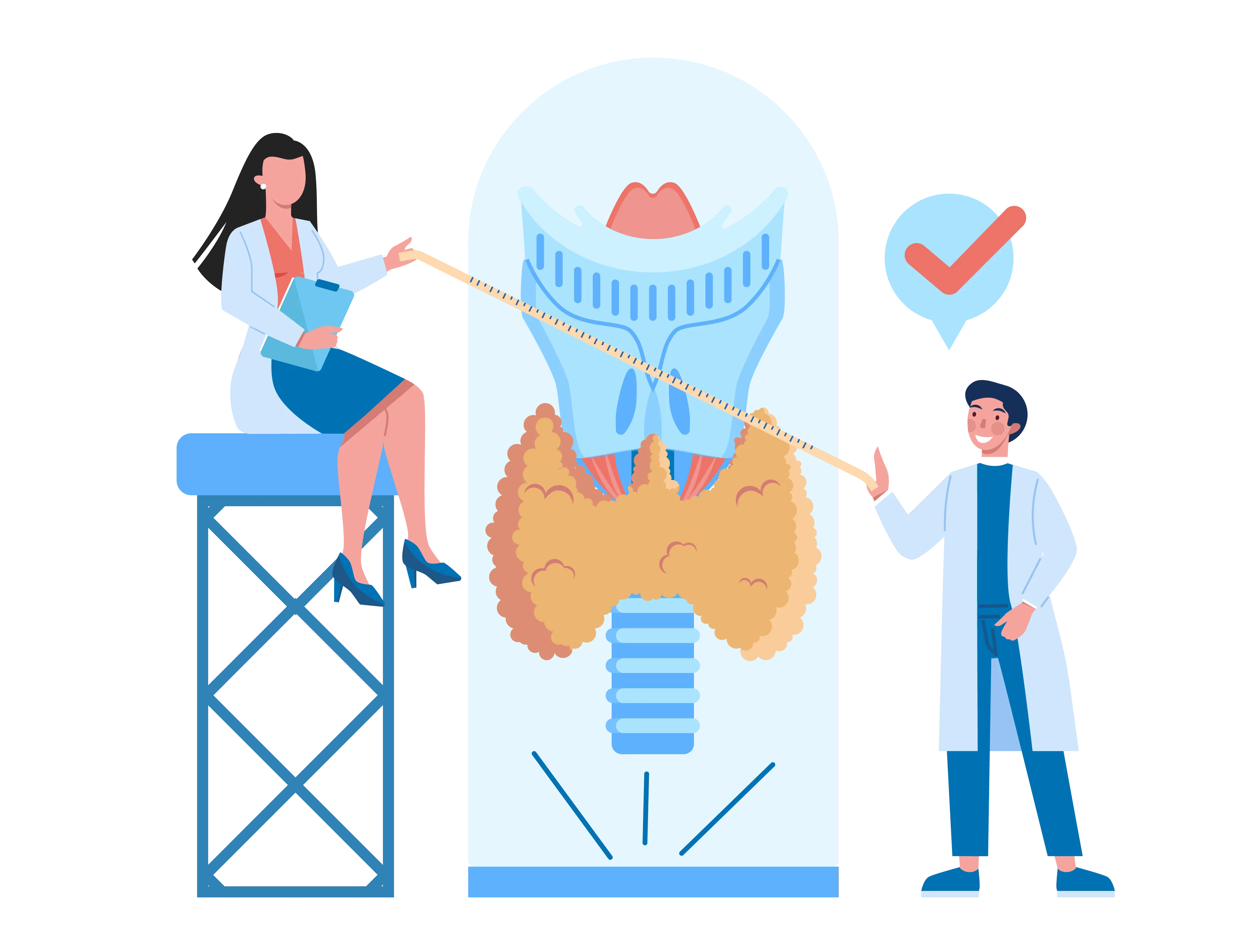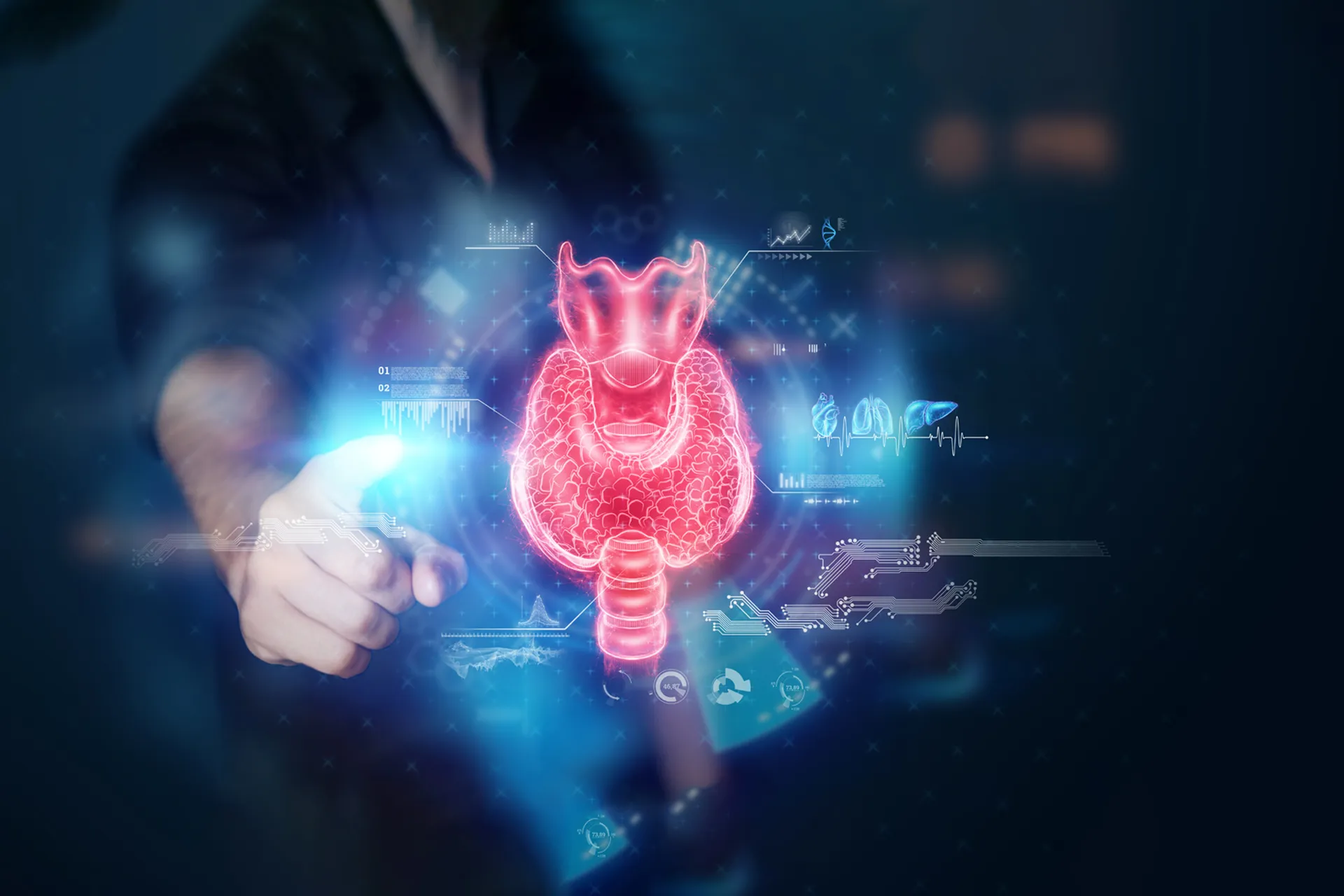Endocrinology | 7 min read
Hyperthyroidism vs Hypothyroidism: What is the Difference?
Medically reviewed by
Table of Content
Key Takeaways
- Hyperthyroidism occurs as a result of excessive hormone secretion
- Hypothyroidism is a result of insufficient secretion of thyroid hormones
- Early signs of hyperthyroidism include an increased heart rate or anxiety
The thyroid forms a part of the endocrine system, which is responsible for proper coordination of different activities in the body. It is a small gland with a butterfly shape located at the base of the neck. Hormones produced by the thyroid gland are responsible for the regulation of many body processes, right from the speed at which you burn calories to the rate at which your heart beats. When the thyroid gland produces either excess or less hormones, it shows signs of a thyroid problem i.e Hyperthyroidism and Hypothyroidism respectyively. Both these conditions require timely medical intervention. Here’s a look at the two.
What is Hyperthyroidism?
Hyperthyroidism is a condition in which your thyroid gland operates in an overactive state and releases too many hormones. These hormones are T3 or triiodothyronine and T4 or thyroxine. The excessive secretion of these results in the speeding up of metabolic processes in the body.
Consequently, your heartbeat rate increases leading to nervousness and anxiety attacks along with increased appetite. While it is common for both men and women to get hyperthyroidism, the probability of women suffering from this condition is more. [1]
Additional Read: Thyroid: Causes, SymptomsHyperthyroidism Causes
Autoimmune disease
More than 70% of instances of an overactive thyroid are caused by Graves' disease. Antibodies persistently stimulate the thyroid and cause hormone overproduction to harm the thyroid.
Nodules
Unusual thyroid tissue growths may cause an overproduction of hormones.
Thyroiditis
When thyroiditis first strikes, it may drive the thyroid to release every hormone it has ever made, leading to temporary hyperthyroidism.
Overmedication
Hyperthyroidism can result from too much thyroid hormone medication to treat hypothyroidism.
Abnormal iodine levels
If you have an iodine deficiency disorder and abruptly increase your intake, you could experience transient hyperthyroidism as your body gets used to the shift.

There are several triggers that can lead to you developing this condition. One of the most common hyperthyroidism causes is an excessive intake of iodine either through medicines or diet. This can lead the thyroid gland to produce excess hormones. Another cause is an autoimmune disorder known as Grave’s disease. Here, your body’s immune system attacks the thyroid gland and causes an excessive secretion of thyroid hormones.
The presence of thyroid nodules in the thyroid gland can also result in hyperthyroidism. Lastly, if the thyroid gland is swollen or inflamed, it can leak hormones, increasing the levels in the body.
Symptoms and Signs of Hyperthyroidism
The symptoms of hyperthyroidism [2] include the following:
- Profuse sweating
- Restlessness
- Anxiety attacks
- Loss of weight
- Sleeping issues
- Irritability
- Increased heartbeat rate
- Brittle hair or nails
- Muscle weakness
- Diarrhea
- Menstrual issues
Complications of Hyperthyroidism
Excessive thyroid hormone effects are felt all over the starting from the heart to the bones. You may feel palpitations in your heart as a result of rapid heartbeat. This can prove problematic and increase the risk of having a stroke. Additionally, excessive thyroid hormones can cause brittle and weak bones, which can lead to osteoporosis. [2]

Symptoms of Hyperthyroidism vs Hypothyroidism
Hypothyroidism is more common than hyperthyroidism. Only a few symptoms are common. The following is a list of signs of hypothyroidism and hyperthyroidism:
HYPOTHYROIDISM | HYPERTHROIDISM |
| Weight gain | Weight loss |
Decreased Sweating | Increased sweating |
| Irregular and heavy periods | Short and light periods |
Slow heart rate | Racing heart |
| Brittle nails | Nail thickening and flaking |
Constipation | Diarrhea |
| Puffy face | Puffy or bulging eyes |
Depression and irritability | Nervousness and anxiety |
Hyperthyroidism Diagnosis and Treatment
Hyperthyroidism can be diagnosed with blood and imaging tests. There are umpteen treatment options for treating hyperthyroidism such as beta blockers and anti-thyroid drugs. However, a surgery can also be done to remove the thyroid gland altogether. In such cases, you need to take thyroid supplements regularly to keep your hormone levels in check.
What is Hypothyroidism?
Hypothyroidism is when the thyroid gland is unable to produce sufficient thyroid hormones. Though the symptoms remain unnoticeable in early stages, if left untreated, this can result in health problems such as joint pain, obesity, heart disease, and infertility. Women are more likely to suffer from hypothyroidism than men and this condition is common in people above 60 years of age. [3]
Hypothyroidism Causes
Autoimmune state
Hypothyroidism may result from autoimmune conditions, including Hashimoto's disease and atrophic thyroiditis. They are the most typical reasons for an underactive thyroid.
Surgical removal
Thyroid cancer, thyroid nodules, or Graves' disease may need the removal of all or a portion of the thyroid gland.
Radiation therapy
This procedure can harm the thyroid gland and decrease its ability to function. Radiation therapy treats some malignancies, Graves' disease, and thyroid nodules.
Congenital issue
It's uncommon for a newborn to be born with a partial or entire absent thyroid gland or other anomalies that affect thyroid function.
Thyroiditis
Thyroid inflammation brought on by atrophic thyroiditis or viral infection.
Specific medications
Pacerone (amiodarone), Lithobid (lithium), Intron A (interferon), Proleukin (aldesleukin or interleukin-2), and checkpoint inhibitors like Yervoy may cause hypothyroidism in those with a hereditary susceptibility (ipilimumab).
Irregular Iodine Levels
Iodine is a vital component of thyroid hormones, so if your body doesn't get enough from the foods you eat, it can't maintain the proper balance of thyroid hormones.
Pituitary gland damage
The pituitary gland's control over the thyroid may be compromised, resulting in a shortage of thyroid hormones if it gets destroyed by a tumor, radiation therapy, or surgery.
Rare Disease
Rare illnesses, such as hemochromatosis, sarcoidosis, and amyloidosis. Each one causes the thyroid to accumulate things that shouldn't be there, which can compromise its ability to operate.
One of the common causes of hypothyroidism is an autoimmune disease called Hashimoto’s thyroiditis. In such a condition, your body produces antibodies that attack your own tissues. Other reasons include anti-thyroid medications, thyroid surgery, or even radiation therapy.
Causes of Thyroid Disease
Thyroid disease is common. In the United States, it affects an estimated 20 million people. Up to 60% of those who have thyroid disease are undiagnosed.
The thyroid gland is a butterfly-shaped organ that produces hormones. Two of these hormones, triiodothyronine (T3) and thyroxine (T4), regulate your metabolism, help your heart, brain, and other organs function, and have a major impact on almost every cell in your body.
The thyroid is regulated by the pituitary gland in the brain. This gland produces a hormone called thyroid-stimulating hormone (TSH) to tell the thyroid to make more T3 and T4. When any part of this system is damaged or malfunctioning, the thyroid can produce either too little or too much T3 and T4. This can cause body-wide symptoms.

Signs of Hypothyroidism in Women and Men
Some of the thyroid condition symptoms include the following.
- Weight gain
- Puffy face
- Fatigue
- Depression
- Slow heartbeat rate
Complications of Hypothyroidism
If hypothyroidism is not treated, it can cause health ailments such as goiter, heart-related issues, myxedema, mental health issues, and peripheral neuropathy. In some cases, it can lead to birth defects if the mother isn’t treated for the condition and in others, it causes infertility.
Treating Hypothyroidism and Hyperthyroidism
Hypothyroidism Treatment | Hyperthyroidism Treatment |
| Thyroxine (T4) replacement | Antithyroid drugs |
Sometimes, added T3 replacement | Radioactive iodine |
Beta-blocker drugs | |
Surgical removal of the thyroid |
Hypothyroidism Diagnosis and Treatment
Like hyperthyroidism, this condition can be diagnosed with a physical examination or by conducting thyroid blood and imaging tests. Since hypothyroidism occurs as a result of insufficient secretion of thyroid hormones, it can be treated by taking hypothyroid medication such as levothyroxine.
Diet for Thyroid Health
Avoid or restrict the following to help safeguard the health of your thyroid:
- Foods that cause blood sugar levels to rise
- Sweets
- Caffeine/Alcohol
- Unhealthy meals
- Unwholesome fats
- Raw kale, spinach, broccoli, cauliflower, Brussels sprouts, peanuts, strawberries, and peaches are examples of goitrogens (foods that slow down your thyroid gland and encourage goitre)
- Table salt
Considering how common it can be to develop these issues, pay close attention to the symptoms. Early treatment can help avoid complications and may even help ensure a full recovery. However, when you do face any of the thyroid condition symptoms, book an appointment with a doctor right away. To find the best in your area, count on Bajaj Finserv Health. Search for specialists and book appointments, either in-person or teleconsultations, online and within minutes.
References
- https://www.narayanahealth.org/blog/are-women-more-prone-to-thyroid-issues/
- https://my.clevelandclinic.org/health/diseases/14129-hyperthyroidism
- https://www.ncbi.nlm.nih.gov/pmc/articles/PMC3340110/
- https://www.niddk.nih.gov/health-information/endocrine-diseases/hypothyroidism
Disclaimer
Please note that this article is solely meant for informational purposes and Bajaj Finserv Health Limited (“BFHL”) does not shoulder any responsibility of the views/advice/information expressed/given by the writer/reviewer/originator. This article should not be considered as a substitute for any medical advice, diagnosis or treatment. Always consult with your trusted physician/qualified healthcare professional to evaluate your medical condition. The above article has been reviewed by a qualified doctor and BFHL is not responsible for any damages for any information or services provided by any third party.



